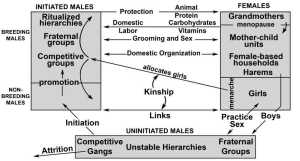UPDATE: It has occurred to me that my two part argument—leveling a criticism of the philosophers’ portrayal of biosocial anthropology as censure-worthy at the expense of an understanding of the complexity of its ideas and normalizing biosocial anthropology in post-war ideas by re-categorizing it as philosophical anthropology—that I focused less on ideas and their genealogies (especially the Gellner bits) than was satisfactory. Thus, quite soon, I will analyze in depth Robin Fox and Lionel Tiger’s The Imperial Animal (1971) as both philosophical anthropology AND as an outgrowth of the re-configuration of the social sciences in the US and the UK after the Second World War. Hopefully, by the time of my review of Joel Isaac’s Working Knowledge: Making the Human Sciences from Parsons to Kuhn (2013) my views on post-war, Cold War American and UK social sciences will be reasonably apparent.
In a previous post, I attempted a taxonomy of post-war inquiries which interrogated the connections between the biological and social sciences in various post-war intellectual communities. Bio-social anthropology, biosocial anthropology, sociobiology and social biology were loosely defined. Part of the challenge of discussing these (mostly) post-war inquiries is in going beyond the fraught discussions over the extent that any or all of these inquiries engage in biological reductionism and biological determinism.
What is needed more is a discussion of the ideas themselves and their genealogies and, by extension, their connections to broader themes in post-war and Cold War sciences. The ideas themselves are quite complicated, and many philosophers of science, such as Mario Bunge (though much of his work is among my favorites in philosophy of science), reduce them to caricatures (intelligent distortions—but reductions which worry about their societal implications and evil intent). On a philosophical and ethical level, these ideas are troublesome and distortions—but they are with us and have been with us for some time. One can talk about the ideational content of (say) public choice theory, without the merits of its practical application. It seems impossible to talk about Hayek or Keynes outside of their virtues as policy, but this must change as well.

Biosocial anthropology, as noted in the last post, is, especially in the works of Robin Fox, part of a philosophical and social science critique against relativism in the social sciences as well as in epistemology. Such a critique draws strength from the methodological writings of Karl Popper (previously mentioned), but even more so from Ernest Gellner. Gellner is the subject of a remarkable biography by John A. Hall (that is not without its problems, and will be reviewed here shortly). Fox’s appropriation of Gellner’s ideas also points to a rather bifurcated legacy on the part of this diverse social thinker: as a philosophical critic and anthropologist and as a theorist of nationalism. Mary Douglas, whose diverse works have never been much understood by anthropologists, but whose ideas have been appropriated by diverse other fields, was deeply scornful of Gellner’s books on nationalism (as evidenced by her oral history with Alan Macfarlane). Fox seems to prefer Gellner the philosopher to Gellner the theorist of nationalism. Hall, valiantly tries to unify them. Such an account is incredibly useful, but at odds with my understanding of Gellner.
Read More…Read More…